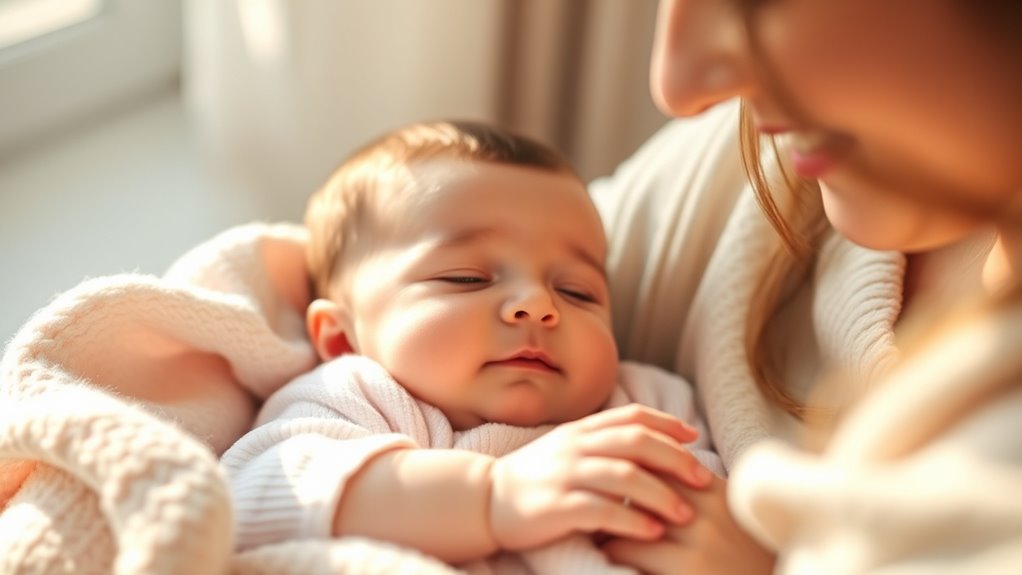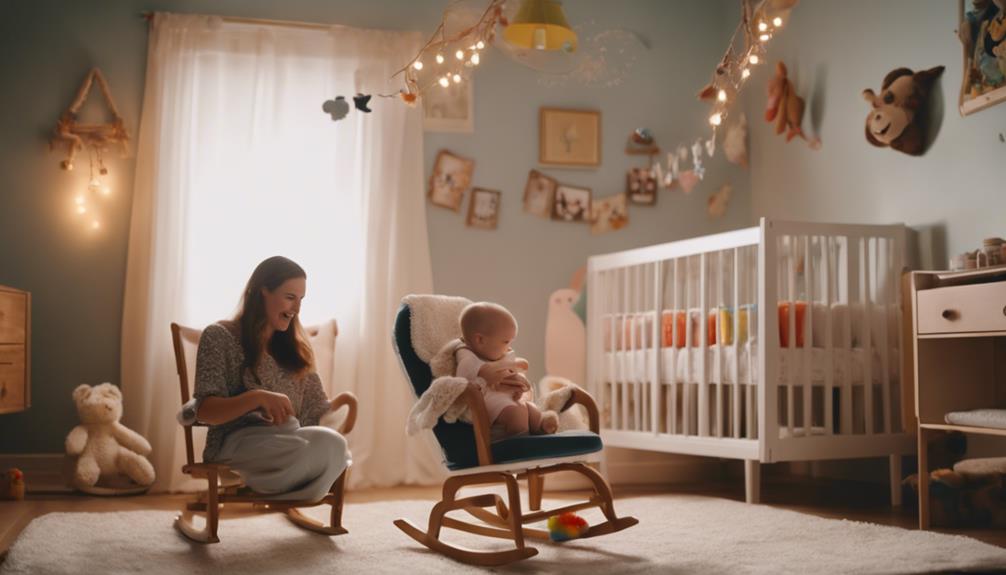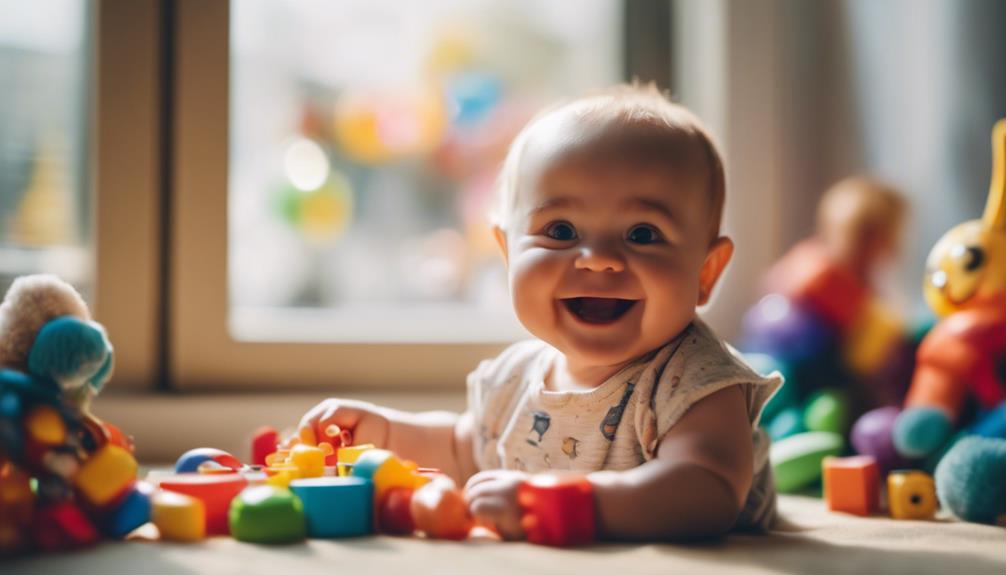Babies don’t understand love as adults do, but they build emotional security through their early interactions with caregivers. When you respond promptly to their cries, hold them gently, and speak softly, you help create a sense of safety and trust. These moments lay the foundation for emotional bonds that influence future relationships. If you’re curious how these early actions impact their long-term well-being, you’ll discover more about nurturing attachment and lifelong emotional health.
Key Takeaways
- Babies experience love through security, trust, and comfort provided by responsive caregiving, not through an intellectual understanding.
- Early interactions like holding, soft speech, and eye contact foster emotional bonds and a sense of safety.
- Consistent, prompt responses to a baby’s needs build attachment and lay the foundation for future emotional security.
- Emotional security in infancy influences future relationships, trust, and social skills development.
- Caregivers’ gentle, reliable presence helps babies develop an innate sense of love and safety from day one.

Many parents wonder if their babies truly understand love, especially in their early months. While it might seem like babies are just tiny bundles of needs, they are actually forming the foundation for emotional development and attachment bonds that will influence how they relate to others for years to come. From the moment you hold your newborn, you’re laying the groundwork for their understanding of love through your actions, tone, and consistency. These early interactions are essential because they help your baby recognize that they are safe, valued, and cared for, which are fundamental components of healthy emotional development.
Babies don’t understand love in the way adults do; instead, they experience it through feelings of security and trust. When you respond promptly to their cries, hold them close, and speak softly, you reinforce attachment bonds that foster a sense of safety. This consistent responsiveness signals to your baby that they can rely on you, which is vital for emotional development. Over time, these repeated positive interactions teach your baby that they are loved and protected, even if they can’t yet express it in words. This process helps build the emotional security that allows your child to explore their environment confidently and develop social skills later in life.
You might notice that your baby calms when you hold them or look into their eyes—this isn’t just comfort; it’s a sign that they are beginning to understand the emotional connection they share with you. These early exchanges create a secure base from which your baby can learn to trust others and develop empathy. As they grow, the attachment bonds formed in those initial months serve as a blueprint for future relationships, shaping how they perceive love and safety. Your gentle touch, soothing voice, and consistent presence all contribute to a foundation where emotional security can flourish. Recognizing that emotional security is crucial in early development helps you understand the importance of responsive caregiving in nurturing healthy, loving relationships later in life.
Frequently Asked Questions
How Early Can Babies Recognize Their Caregivers?
You might wonder how early babies recognize their caregivers. Usually, by around 6 weeks, they start showing attachment styles through bonding behaviors like eye contact and crying when apart. This early recognition helps build trust and emotional security. Your consistent presence and responsive care strengthen this bond, fostering a sense of safety. The more you respond to their cues, the more deeply they recognize and connect with you from a very early age.
Can Babies Feel Emotional Warmth From Strangers?
Ever wondered if babies can sense emotional warmth from strangers? While they may not fully understand love, they develop emotional recognition early on. Stranger anxiety typically appears around 6-12 months, showing babies can distinguish familiar from unfamiliar faces. During this time, they pick up on emotional cues, feeling comfort or unease. So, even strangers’ warmth can influence their emotional security, helping them learn trust and attachment gradually.
Do Babies Remember Past Interactions With Caregivers?
You might wonder if babies remember past interactions with caregivers. While their memory isn’t fully developed, they do form attachment styles based on emotional recognition and consistent care. These early experiences influence how they respond to caregivers later. So, although they may not recall specific moments, their emotional recognition helps them build a sense of security, shaping their attachment style and trust in relationships as they grow.
How Does a Baby’s Temperament Affect Their Understanding of Love?
Your baby’s temperament influences how they understand love by shaping their emotional responsiveness and infant personality. If your baby is naturally more sensitive or shy, they may need extra reassurance to feel secure and loved. By recognizing their unique traits, you can respond appropriately, fostering trust and emotional security. Your consistent affection and understanding help your little one develop a sense of love, even if their temperament is more reserved or reactive.
Can Babies Sense Changes in Caregiver Emotions?
You might notice that babies can sense changes in caregiver emotions through subtle emotional cues. They pick up on your tone, facial expressions, and body language, which influence their sense of security. Your caregiver intuition helps you respond appropriately, reassuring your baby even when you’re feeling upset. By being attentive to these cues, you foster trust and emotional security, making your baby feel safe and understood from the very start.
Conclusion
By now, you realize that even from day one, your baby senses your love and care, laying the foundation for emotional security. Think of it as planting a seed in fertile ground—what you nurture today will blossom tomorrow. Remember, just like an old-time lighthouse guiding ships safely home, your consistent affection lights the way for your little one’s emotional journey. Trust in your love; it’s the compass that will always steer them right.










